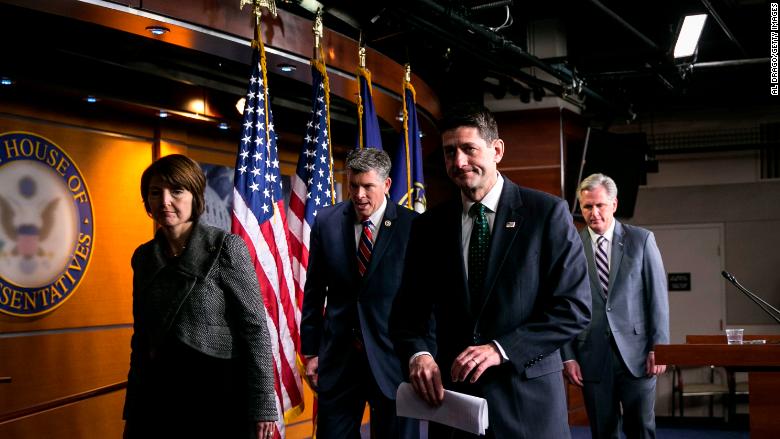How do people feel about GOP tax bill? It depends on who you ask.
Some business, advocacy and trade groups have major concerns with it. Others say the tax plan will be boost the economy.
The plan isn’t law yet. Another round of votes is due in the coming days. Republican leaders on Capitol Hill have vowed to get it to President Trump for his signature by Christmas.
Here’s a breakdown of some responses, pro and con. The statements have been condensed in some cases for brevity.
It will leave millions uninsured
The bill rolls back a key provision of Obamacare known as the individual mandate. The nonpartisan Congressional Budget Office has forecast that 13 million fewer people would have health insurance coverage by 2027, and premiums would rise by about 10% in most years.
Families USA: “Republican leadership in the House and Senate have come up with a deal that will increase health insurance premiums, making millions of people — including those with pre-existing conditions like cancer or diabetes — pay more for their coverage, while causing millions more to lose their health coverage altogether. All of that to fund permanent tax cuts for their wealthy donors and corporations.” — Families USA Executive Director Frederick Isasi
Families USA is a left-leaning advocacy group that works on behalf of health care consumers.
Its lower corporate tax rates will boost the economy
The bill slices the corporate rate to 21% from 35% and lowers the tax burden for pass-through businesses, such as LLCs and partnerships.
Business Roundtable: “Business leaders applaud the conference committee for coming to an agreement that will promote U.S. competitiveness and spur economic growth.” –Business Roundtable statement
Business Roundtable is an association of CEOs from some of America’s largest corporations.
American Bankers Association: “ABA believes the significant reforms included in this legislation will help grow the economy and create jobs. We particularly applaud the provisions that significantly lower tax rates for all types of businesses beginning in 2018. Banks currently have one of the highest effective tax rates of any industry, and these important changes will allow our members to better serve their customers and the broader economy.” –ABA president and CEO Rob Nichols
ABA represents small, midsize, regional and large banks.
Americans for Prosperity: “This final tax reform plan delivers relief to the working class while unleashing opportunity and growth for America’s small business owners and job creators. … Although not perfect, the House and the Senate should be commended for their diligent work to significantly improve our broken system, and the Trump White House deserves credit for its relentless focus on getting tax reform done this year. –AFP President Tim Phillips.
AFP is a conservative advocacy group.
Financial Services Roundtable: “Tax reform will help deliver expanded opportunity for individuals and American businesses of all sizes. Congress should quickly move tax reform over the finish line and enable America to go on economic offense.” –Financial Services Roundtable CEO Tim Pawlenty
Financial Services Roundtable is an advocacy group that represents banks and credit card companies.
It will be bad for homeowners
The bill lowers the cap on mortgage interest deduction from $1 million to $750,000, and it eliminates the deduction for interest on home equity loans. Homeowners who already have a mortgage would be unaffected by the change.
California Association of Realtors: “The final tax reform bill released punishes homeowners and weakens homeownership. … Congress is touting this as a tax cut for middle-class families, but the reality is that thousands of California middle-class homeowners will be the first ones to face tax increases.” –CAR President Steve White
CAR is a trade group that represents 190,000 California brokers and other real estate professionals.
It will hurt states and cities
The bill will preserve the state and local tax deductions for anyone who itemizes, but it will cap the amount at $10,000.
National League of Cities: “Congress can’t pay for tax reform by stripping the tools that help build stronger, healthier and more economically vibrant communities. [The bill] preserves many key credits and partially protects the deduction for state and local taxes (SALT). Unfortunately, the final bill falls short on its promise to protect American families and the cities and towns in which they live.” –NLC President Mark Stodola, mayor of Little Rock, Arkansas
NLC is an advocacy group that works on behalf of 19,000 American cities and towns.
It will gut charitable giving
The tax bill roughly doubles the standard deduction. Taxpayers can only claim deductions for their charitable donations if they itemize. Nonprofits argue the higher standard deduction will abolish a key giving incentive.
National Council of Nonprofits: “The deal … will prove disastrous to the work of charitable nonprofits in communities across America. … If enacted, the bill would, among other things: damage charitable giving by $13 billion or more annually; destroy more than 220,000 nonprofit jobs; and impair the ability of nonprofits to address community needs. … Simplifying the tax code could have been a noble exercise, but this bill would do much more harm than good.” –National Council of Nonprofits President and CEO Tim Delaney
National Council of Nonprofits is an advocacy group that works on behalf of charitable nonprofits in the United States.
It will harm small businesses
The bill establishes new rules for businesses that file taxes on their individual returns, known as pass-throughs.
Businesses for Responsible Tax Reform: “The proposals also do little to simplify the code, and actually make it more complex for the more than 90% of small businesses that organize their firms as pass-through entities. This means [small business] owners will continue to sink time and money into complying with a byzantine and bewildering tax code, further tilting the playing field in favor of large corporations that can afford armies of accountants to search out every loophole and advantage. … A ballooning deficit is bad for business because it drives interest rates higher. –Letter to Congress from Businesses for Responsible Tax Reform, signed by nearly 2,000 entrepreneurs
Businesses for Responsible Tax Reform is an advocacy coalition that works on behalf of small business owners.
It will help the economy but add to federal debt
The bill, while lowering corporate taxes, would increase deficits by an estimated $1.46 trillion over a decade, according to the nonpartisan Joint Committee on Taxation.
American Enterprise Institute: “The bill features a long overdue reduction in the corporate tax rate that will draw investment to the United States, boosting workers’ productivity and wages. However, the bill will also increase government debt, threatening to drive up interest rates and counteract the increase in investment. A plan to address the long-run fiscal imbalance has become even more imperative.” –AEI Resident Scholar Alan D. Viard
AEI is a Washington, D.C.-based think tank that advocates for libertarian and free-enterprise causes.
CNNMoney (New York) First published December 17, 2017: 3:57 PM ET









